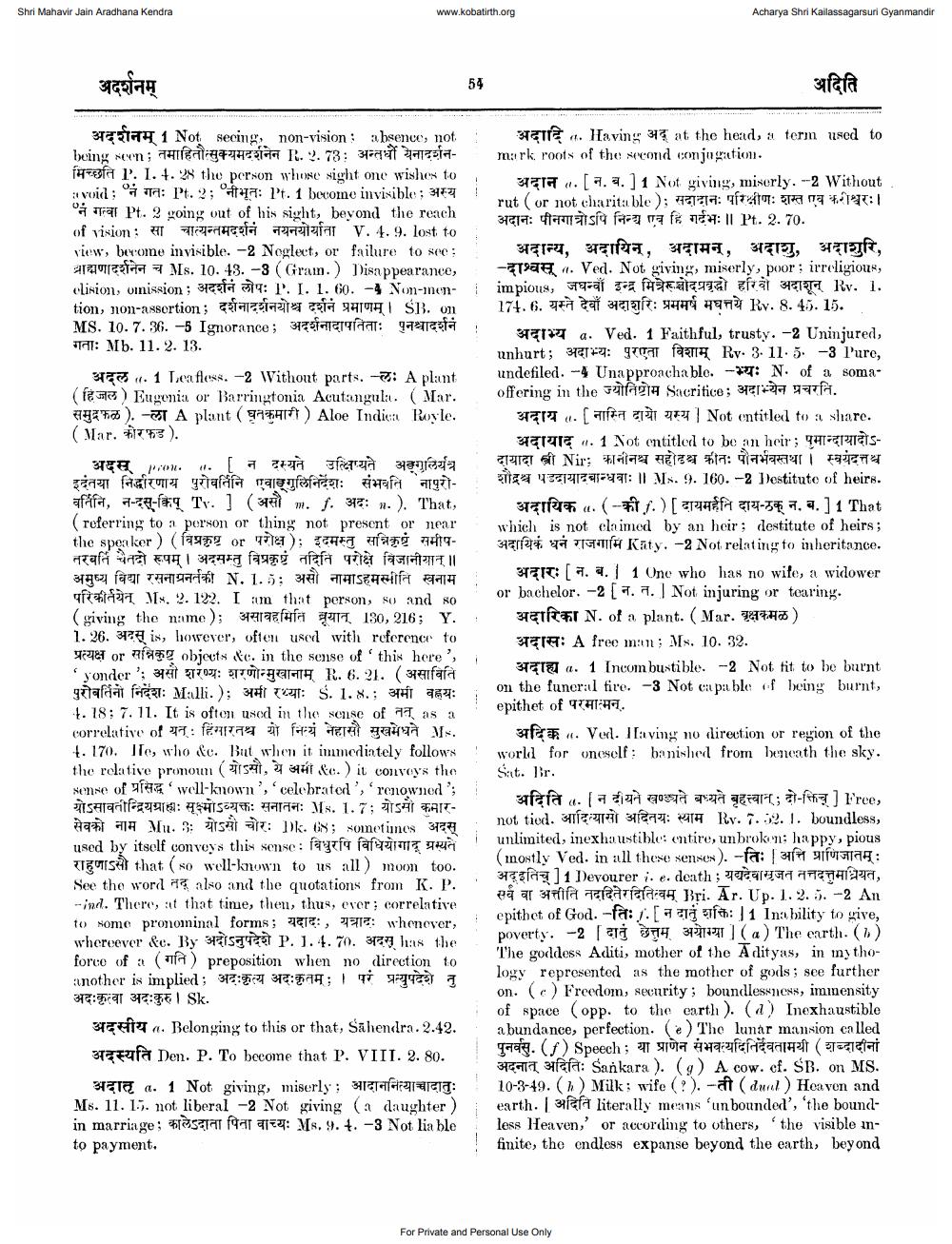________________
Shri Mahavir Jain Aradhana Kendra
www.kobatirth.org
अदर्शनम्
अदर्शनम् 1 Not secing, non-vision absence, not being seen ; तमाहितौत्सुक्यमदर्शनेन R. 2.73 अन्तर्धी येनादर्शनfifa 1. 1. 4. 28 the person whose sight one wishes to "नं गतः Pt. 2 नीभूतः Pt. 1 become invisible; अस्य Avoid: "नं गत्वा Pt. 2 going out of his sight, beyond the reach of vision : सा चात्यन्तमदर्शनं नयनयोर्याता V. 4. 9. lost to view, become invisible. -2 Neglect, or failure to see: ब्राह्मणादर्शनेन च Ms. 10. 43. -3 ( Gramm.) Disappearance, elision, omission; अदर्शनं लोपः P. I. 1. 60. -4 Non-mention, non-assertion; दर्शनादर्शनयोश्च दर्शनं प्रमाणम् । ŚB. om MS. 10.7.36. -5 Ignorance; अदर्शनादापतिताः पुनश्चादर्शनं भगताः Mb. 11. 2. 13.
|
अदल . 1 Deafless. -2 Without parts लः A plant ( हिजल) Eugenia or Barringtonia Acutangula. ( Mar. समुद्रफळ ). - ला A plant ( घृतकुमारी ) Aloe Indica Boyle. (Mar. कोरफड),
अदस् prom. ... [न दयते
त्रि तया निरिणाम पुरोनिने एलिना संभवति नारी'नापुरोवर्तिनि न दस्- क्विप् Tv. ] ( असौ m. /. अदः . ). That, (referring to a person or thing not present or near the speaker ) ( विप्रकृष्ट or परोक्ष ) इदमस्तु सन्निकृष्टं समीप - तरवर्ति चैतदो रूपम् । अदसस्तु विप्रकृष्टं तदिति परोक्षे विजानीयात् ॥ अमुष्य विद्या रसनाग्रनर्तकी N. 1.5: असौ नामाऽहमस्मीति वनाम परिकीर्तयेत् M. 2. 122. I am that persons so and so (giving the name): असावहमिति ब्रूयात् 130, 216; Y. 1.26. अदसू is, however, often used with reference to प्रत्यक्ष or सन्निकुष्ट objects &c. in the sense of 'this here', 'yonder '; असौ शरण्यः शरणोन्मुखानाम् P. 6. 21. ( असाविति पुरोवर्तिनो निर्देश: Malli ); अमी रथ्याः S. 1.8; अमी वयः 4.18; 7.11. It is often used in the sense of तन् as a correlative of यत् : हिंसारत यो नित्यं नेहासौ सुखमेधते M. 4. 170. He, who &c. But when it immediately follows the relative pronoun ( योऽसौ, ये अमी &c.) it conveys the sense of प्रसिद्ध ' well-known', 'celebrated', 'renowned ; योऽसावतीन्द्रियग्राह्यः सूक्ष्मोऽव्यक्तः सनातनः Ms. 1.7; योऽसौ कुमारसेवको नाम Mu. 3: योऽसौ चोरः Dk. 68; sometimes अदस् used by itself conveys this sense: विधुरपि विधियोगाद् ग्रस्यते राहुणाऽसौ that (so well-known to us all) moon too. See the word also and the quotations from K. P. -ind. There, at that time, then, thus, ever correlative to some pronominal forms; यदादः, यन्त्रादः whenever, whereever &c. By अदोऽनुपदेशे P. 1. 4. 70. अदम् has the force of a (गति) preposition when no direction to another is implied ; अदःकृत्य अदःकृतम्: । परं प्रत्युपदेशे तु
अदः कृत्वा अदःकुरु । Sk.
अदसीय a. Belonging to this or that, Sahendra. 2.42. अदस्यति Den. P. To become that P. VIII. 2. 80.
अदातृ 1 Not giving, miserly आदाननित्याच्चादातुः Ms. 11. 15. not liberal -2 Not giving ( a daughter ) in marriage; कालेऽदाता पिता वाच्यः Ms. 9. 4. -3 Not lia ble to payment.
54
Acharya Shri Kailassagarsuri Gyanmandir
अदिति
d.
अदादि 4. Having अद् at the head term used to mark. roots of the second conjugation.
अदान . [ न..]1 Not giving, miserly. --2 Without rut (or not charitable ): सदादानः परिक्षीणः शस्त एवं करीश्वरः । अदानः पीनगात्रोऽपि निन्द्य एव हि गर्दभः ॥ Pt. 2 70.
"
अदान्य, अदायिन अदामन, अदाशु, अदाशुरि, -दाश्वस् . Ved. Not giving, miserly, poor irreligious, impions, जघन्वा इन्द्र मित्रोदवृद्धो हरिवो अदाशून् Rv. 1. 174.6. यस्ते देवाँ अदाशुरिः प्रममर्ष मघत्तये Rv. 8. 45.15.
अदाभ्य a. Ved. 1 Faithful, trusty. -2 Uninjured, unhurt; अदाभ्यः पुरएता विशाम् Rv. 3. 11. 5. -3 Pure, undefiled. -4 Unapproachable. -भ्यः N. of a somaoffering in the ज्योतिष्टोम Sacritice; अदाभ्येन प्रचरति.
अदाय [ नास्ति दायो यस्य | Not entitled to a share.
अदायाद . 1 Not entitled to be an heir; पुमान्दायादोऽदायादा स्त्री Nir: कानीनश्च सहोदय क्रीतः पौनर्भवस्तथा । स्वयंदत्तथ शौद्रव पडदायादबान्धवाः ॥ Ms. 9. 160. -2 Destitute of heirs.
अदायिक . ( की .. ) [ दायमर्हति दाय-ठक् न, ब. ] 1 That which is not claimed by an heir; destitute of heirs ; अदायिकं धनं राजगामि Katy. -2 Not relating to inheritance.
अदारः [न. ब. | 1 One who has no wife, a widower or bachelor. –2 [ न. न. | Not injuring or tearing. अदारिका N. of a plant. (Mar. वृक्षकमळ )
अदासः A free man; Ms. 10. 32.
अदाह्य . 1 Incombustible. -2 Not fit to be burnt on the funeral fire. -3 Not capable of being burnt, epithet of परमात्मन्.
अदिक्क . Ved. IHaving no direction or region of the world for oneself: banished from beneath the sky. Sat. Br.
अदिति (d). [ न दीयते खण्ड्यते बध्यते बृहत्त्वान; दो-क्तिच् ] Free, not tied. आदित्यासो अदितयः स्याम Rvy. 7.52 1. boundless, unlimited, inexhaustible: entire, unbroken: happy, pious (mostly Ved. in all these senses ) -तिः | अत्ति प्राणिजातम्: अदुइतिच् ] 1 Devourer i. e. death ; यद्यदेवासृजत ननदत्तुमप्रियत सर्वं वा अतीति नददितेरदितित्वम् Bri. Ar. Up. 1. 2. 5. -2 An epithet of God. -तिः /- [ न दातुं शक्तिः । 1 Inability to give, poverty. -2 | दातुं छेत्तुम अयोग्या | ( a ) The earth. (i) The goddess Aditi, mother of the Adityas, in mythology represented as the mother of gods; see further on. (e) Freedom, security; boundlessness, immensity of space (opp. to the earth ). ( a ) Inexhaustible abundance, perfection. (e) The lunar mansion called पुनर्वसु (J) Speech या प्राणेन संभकयचिनिन अदनात् अदिति: Sankara ) (g) A cow. ef. ŚB. on MS. 10-3-49. (1) Milk : wife ( ? ). -ती (dual) Heaven and earth. | अदिति literally means 'unbounded', 'the boundless Heaven,' or according to others, the visible in finite, the endless expanse beyond the earth, beyond
For Private and Personal Use Only




